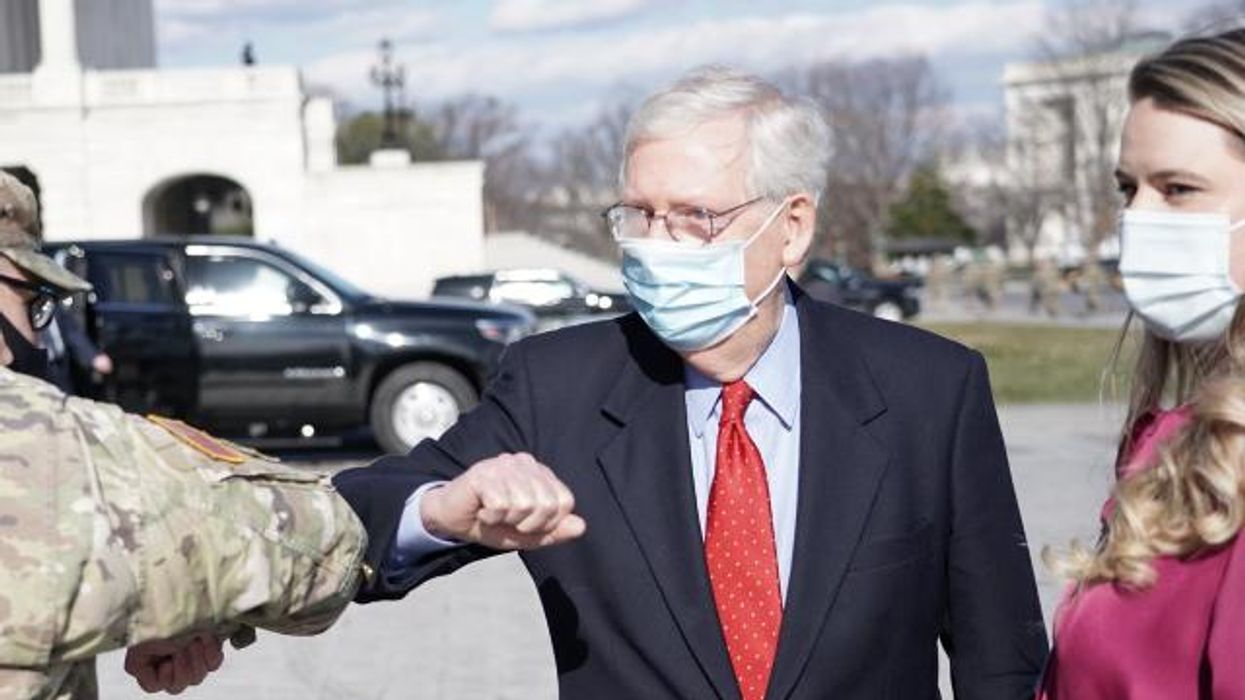
Sen. Mitch McConnell
Reprinted with permission from Alternet
Senate Minority Leader Mitch McConnell backed down Monday night from his fight with Majority Leader Chuck Schumer, though it was unclear exactly who came out on top.
McConnell had moved to stall the chamber's organizing resolution, which would allow the formation of newly constituted committees with all the new senators and with Democrats in charge. Though Schumer and McConnell agreed on the basic outlines of the power-sharing arrangement, the minority leader had held up the process over his demand that Democrats agree not to abolish or scale back the filibuster, which requires 60 votes to pass most legislation in the Senate.
Democrats haven't explicitly planned on abolishing the filibuster, despite demands from activists who say doing so is necessary for their progressive agenda. But Schumer bristled at McConnell's effort to use the organizing resolution to extract this concession. So the two found themselves at a stalemate.
On Monday, though, McConnell decided to break the stalemate. He cited recent statements from Sen. Kyrsten Sinema of Arizona and Joe Manchin of West Virginia, who reiterated their previous commitments to retaining the filibuster.
"Today two Democratic Senators publicly confirmed they will not vote to end the legislative filibuster," McConnell said in a statement said. "With these assurances, I look forward to moving ahead with a power-sharing agreement modeled on that precedent."
Since Democrats only have 50 Senate seats, they would need every single member of the caucus to agree if they were going to reform the filibuster. Without Manchin and Sinema's consent, it will remain in place.
So did McConnell win the standoff with Schumer? Observers split on this question.
Arguably, McConnell made Schumer look weak by showing that his caucus isn't in lockstep behind him. Manchin and Sinema were willing to cave on the filibuster, making Schumer essentially irrelevant to the demands McConnell was making.
But on the other hand, Sinema and Manchin were already on the record opposing the filibuster. Perhaps McConnell is happy to get them on the record again, but that's an odd result to show for the days of drama he created unnecessarily. And if Manchin and Sinema change their minds down the road about the filibuster, there's nothing McConnell will be able to do to stop them.
And ultimately, McConnell didn't get what he seemed to be seeking: Schumer's own promise that changes to the filibuster were off the table.
"McConnell didn't get anything here," said Adam Jentleson, a former top Democratic Senate staffer who has called for an end to the filibuster. "Manchin and Sinema said the same thing they've said before. Bringing them around to reform is and was always going to be a process that likely requires repeated GOP obstruction. McConnell picked this fight, lost and is now doing a little CYA."
- Sunday Shows Whitewash Republicans' History Of Obstructionism ... ›
- McConnell Already Plotting To Obstruct President Biden - National ... ›
- Mitch McConnell Didn't Just Steal A Supreme Court Seat - National ... ›
- Republicans Insist On Preserving Filibuster (Except When They Don ... ›








